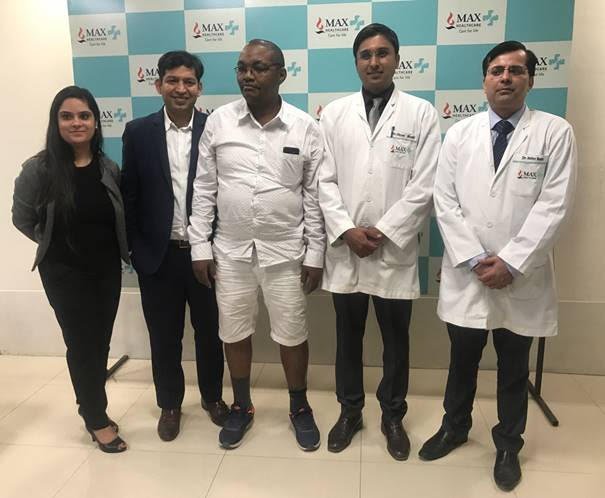Max Healthcare performs India’s 1st Daycare Total Knee Replacement surgery
November 22, 2018 | Thursday | News
A revolutionary minimally invasive technique used to complete the surgery in one hour
Knee, the largest joint in the human body, supports the movement of legs and is an essential requirement to perform most of the daily activities. Due to injury or disease, knees can get damaged causing pain and impaired function. Total Knee Replacement (TKR) surgery is a procedure to replace the affected knee joint with artificial material and serves as a savior for patients with struggling with severely damaged knee joints.
One such patient, 60-year old Joseph Maina Githemba from Kenya, was advised replacement for his left knee owing to an accident he had met 15 years ago. Under the care of Dr. Vikram Mhaskar, Consultant – Knee & Shoulder Surgery, Max Smart Super Speciality Hospital, Saket, Joseph underwent complete check-ups before the surgery including blood tests, ECG, X-rays, cardiology and physician tests & pre-anesthesia checkup (PAC). He was ascertained as an ASA Grade 1/2 patient and was given quick clearance as he did not suffer from any comorbidities. Joseph was trained to do exercises that would be required post-surgery.
Dr. Vikram and his team performed the 1st daycare TKR in India using minimally invasive technique that included no tourniquet, injecting local anaesthesia into the skin before incision as well as into tissues at regular intervals, meticulous dissection, catching all bleeds before closure of the wound and injection of tranexamic acid to reduce bleeding post-operation. General anaesthesia with adductor canal block was used to make sure that the bleeding is minimal. Along with this, a catheter was inserted into the adductor canal so that the pain relief medicine was continuously flowing around the nerve.
Delighted at the success of the first-of-its-kind surgery, Dr. Vikram Mhaskar, Consultant – Knee & Shoulder Surgery, Max Smart Super Speciality Hospital, Saket, said, “Total Knee Replacement has been a time taking procedure with around 3 hours of surgery and considerable hospital stay post operation. Daycare TKR has served as a revolution in healthcare industry with minimal incision, exposure, blood loss and hospitalization. It also brings down the total cost by 30-35% compared to standard TKRs. Choosing the right patient is crucial and no comorbidities in Joseph’s case made this first daycare TKR procedure a success. We wish him a speedy recovery.”
Talking about his successful surgery, Joseph Maina Githemba said, “I was under severe dismay when I met with an accident around 15 years ago. I damaged my knee badly and was unable to walk with sharp pain. I decided to go for the TKR procedure as a last resort but had my doubts about the success of the daycare surgery. To my pleasant surprise, I was prepared for the procedure through exercises, several tests and pre-anaesthesia checkup. The surgery was absolutely painless and only took 1 hour. I was back on my feet the same day and could return to the comfort of my home. The role of healthcare services at home in my speedy recovery has been invaluable with critical care nurses and professional supporting me every step of the way. I am thankful to Dr. Vikram and his team for helping me goes through this procedure.”
Speaking on the accelerated recovery of the patient, Vaibhav Poddar, Executive VP - Max@Home, Ambulance & Rehab Medicine, Max Healthcare, said, “To enhance recovery, Max@Home provides medical expertise and quality care within the comfort of the patient’s home. As this was the 1st Daycare TKR procedure, we were extra cautious regarding all the arrangement and support systems. Joseph was provided with round-the-clock critical care nurses, calf pumps, monitoring systems, ambulance and doctors on standby, crash cart with essential life-saving drugs and robust infrastructure to tackle any and all requirements. All the medications were stocked in advance and communication channels were established for constant reporting to Dr. Vikram. We are happy to be a part of this first-of-its-kind procedure and wish to continue our journey in supporting the patients and helping them recover as fast as possible.”
With prior planning of implant selection, surgical technique, anaesthesia and analgesia, Daycare TKR ensured minimum surgery time, blood loss and mental stress for the patient. The surgery took only 1 hour with a minimal hospital stay of 12 hours. As part of rehabilitation, Joseph was made to walk using a walker within 6 hours of the operation and was discharged briefly with information about the exercises to be done at home. Showing excellent improvement, Joseph could walk without a support in 48 hours. He reported no constipation that is otherwise a usual observation during normal TKR procedure due to convalescence and changes dietary habits. A normal TKR procedure takes up to 3 hours of surgery with 96 to 168 hours of hospitalization. It takes at least 24 hours for the patient to be mobilized and a long period of 3 weeks before the patient can walk without support.
Max@Home was a crucial component of the entire procedure as a handpicked team of critical care nurses and other professionals looked after the patient for 5 days after the surgery. Entire infrastructure and technology was provided at home for monitoring and constant information purposes using message and video conference. As part of the set post-operative care, intensive care nurse, doctor visit twice a day, visit by anaesthetist and physiotherapist for the next 48-72 hours was scheduled to support the recovery of the patient. An accelerated rehabilitation protocol was followed along with arrangements for medications, crash cart with all essential life-saving drugs, ambulance and doctors on standby and established communication channels for emergency purposes.









